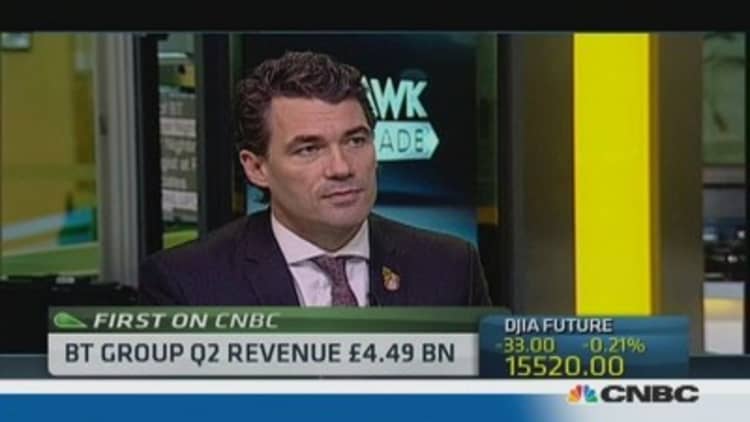Britain's BT has beaten BSkyB to win the right to show Champions League soccer from 2015, in the biggest blow to Rupert Murdoch's dominant pay-TV operator since it started broadcasting more than 20 years ago.
BT, the 168-year-old former state telecoms monopoly, said it would pay 299 million pounds ($478 million) a season to add the glamour ties of Barcelona versus Manchester United and Real Madrid versus Bayern Munich to the English Premier League matches it already shows.
The deal means BT will replace BSkyB and Britain's biggest free-to-air commercial channel, ITV, as the sole provider of Champions League matches on Tuesday and Wednesday nights. BT will also show the UEFA Europa League for three years, Europe's second-tier soccer competition.
"The live rights will give a major boost to BT Sport and give people yet another reason to take our terrific service," Gavin Patterson, BT chief executive since September, said. "BT Sport has got off to a strong start with customers enjoying what we have to offer."
BT, which said it would show a selection of the matches for free, said the contract would not affect its financial targets.
The group, which had spent years slashing costs after two major profit warnings in 2008 and 2009, stunned the sporting world in 2012 when it won the rights to show 38 live Premier League matches a season.
While the new entrant to the market remained a minnow in comparison to BSkyB and its 116 games, the move was an early indication of how BT was willing to spend big to protect its core broadband and fiber services by combining it with an offer of high-quality sports programming.
(Read more: BT Sport helps lift BT results)

With annual revenues of more than 18 billion pounds, BT was also in a completely different league to the two previous groups that had tried to challenge BSkyB in the British home entertainment market - Ireland's Setanta and ESPN.
When BT announced in May that it would offer the sports service free to its broadband customers, it sent shares in BSkyB tumbling as investors questioned the long-term impact on a group that had built its business around sports and movie programming to broadcast in more than 10 million homes.
Blow to BSkyB
The three-year, 900 million pound deal signed by BT is worth more than double the 400 million pounds BSkyB and ITV agreed to pay for the current three-year contract back in 2011.
"We bid with a clear view of what the rights are worth to us," a spokesman for BSkyB said. "It seems BT chose to pay far in excess of our valuation."
BSkyB, 39-percent owned by Rupert Murdoch's 20th Century Fox, first won the rights to show Europe's premier competition in 2002 and has flourished as the Champions League and English Premier League grew in popularity.
In the current three-year contract BSkyB had the right to show seven live matches on Tuesday nights and eight live matches on Wednesday night, while ITV showed one live match on Tuesday evenings, invariably featuring one of the English teams.
The loss of the games from the 2015/16 season will leave a huge hole in Sky's programming schedule and will likely put pressure on the group to agree a wholesale deal with BT so it can still show the matches to its subscribers.
Alternatively, Sky subscribers could take pay-TV channels from Sky but take their broadband from BT in order to access all the live sport.
BSkyB is thought to have around 5 million subscribers to its sports channels, while BT said in October it had more than 2 million homes signed up to its new sports service. It is present in 4 million homes due to a wholesale deal with cable operator Virgin Media.
"Despite these payments, BT's financial outlook is unchanged," it said. "The rights are expected to drive additional growth in BT consumer revenue and profits over the medium-term."
The extra money paid by BT could be used by UEFA to boost the prize money of both competitions, including the secondary Europa League.

